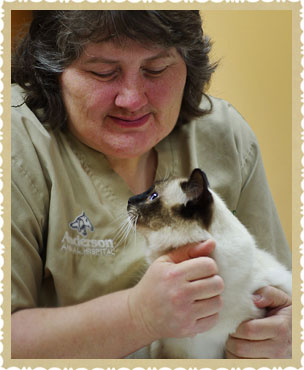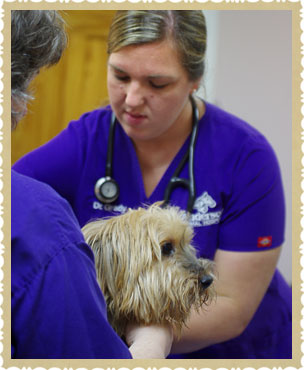Wellness Care for Every Age and Stage

The staff at Anderson Animal Hospital is committed to providing you and your pet the finest veterinary care possible. We're a welcoming, skilled, and cost-conscious partner in the care of your beloved companions.
Dr. Kathryn Anderson and her veterinary team at Anderson Animal Hospital believe that prevention contributes to your pet's long-term health and minimizes the lifetime cost of care. We strongly recommend routine wellness exams, vaccinations, regular laboratory work, deworming and fecal checks, as well as medications to prevent heartworm, fleas, and ticks to keep your pet in optimum health.
We also bring this philosophy into our equine practice. Whether you own a horse farm or are a homeowner with a beloved backyard horse, we have the training, expertise, facility, and equipment to keep your equine healthy.
Despite the very best preventive care, a beloved pet may develop an illness or be injured. Our internal medicine and surgical expertise, as well as our advanced diagnostic capabilities and veterinary laboratory, ensure your pet receives a quick and accurate diagnosis. We take time to explain our diagnosis to you and provide you with various options for your pet's treatment.
Please take a look at the services we offer to learn why we believe they are important to the care and well-being of your pet. Then give us a call to set up an appointment today!
Examinations
Wellness examinations are the same for your pet as the yearly physical you receive from your doctor. It's a chance for us to assess your pet's overall health, discuss any changes we see, and educate and update you on advancements in veterinary care. It is also an opportunity for you to discuss any of your concerns or ask questions.
Your pet's yearly wellness examination at Anderson Animal Hospital includes our commitment to:

- Examine your pet's teeth, throat, and oral cavity
- Check your pet's vision and examine the eyes
- Examine the ears for infection, ear mites, allergic reaction, and other health issues
- Examine the respiratory system
- Assess your pet's heart and evaluate cardiac function
- Test your pet's reflexes
- Palpate lymph nodes and abdomen
- Inspect the skin
- Palpate joints and muscles for arthritis and other orthopedic conditions
- Evaluate the function of internal organs and other systems
- Assess changes in your pet’s body weight, appetite, urination, and bowel habits
- Inquire as to your pet’s activity level
- Palpate the skin for unusual growth developments
- Monitor your pet’s blood count
- Utilize laboratory testing to detect early signs of Lyme, Heartworm disease, and other tick-borne diseases
- Assess general or specific changes in your pet’s health since the last visit
- Discuss preventive techniques with you, the pet owner
- Collect and examine fecal samples for signs of parasitic infestation
- Evaluate your pet for repetitive licking or biting in one area
- Assess your pet’s hair/fur and check for matting
- Demonstrate to you, the pet owner, how to administer at-home medication
- Engage you, the pet owner, in conversation and answer your questions and concerns
Deworming and Fecal Check

Dangerous parasites are always present in the environment. We recommend regular fecal checks and deworming as the best way to prevent parasitic disease and the transmission of intestinal parasites to your pet and your family members.
Regular Blood Testing
A complete physical should include a full blood workup. Not only can a chemistry panel and blood count identify the presence of underlying disease processes, but these tests help create a baseline should your pet become ill between regular examinations.
Flea and Tick Borne Disease
Fleas and ticks are more than a nuisance; they carry diseases dangerous to both you and your pet. Although they're a bigger problem in certain parts of the country and at specific times during the year, no cat or dog is completely safe from them. Fleas can transmit tapeworms, and often you can see segments of the tapeworm in your pet's stool. In our region, ticks can carry a variety of serious illnesses, including Lyme disease, Ehrlichia, and Rocky Mountain Spotted fever (albeit rare).
Fortunately, these problems can be mitigated by using one of the parasite prevention products available at our hospital. When used properly and according to our directions, these products are very safe and effective.
Heartworm Disease
Heartworm disease is a serious, life-threatening disease affecting dogs and cats. Mosquitoes spread the disease by injecting the parasite into your pet at the time of the bite. Clinical symptoms of heartworm disease develop very slowly. Lack of energy and exercise intolerance are early symptoms, as are coughing and difficulty breathing. Because heartworm disease is increasing in frequency and is a serious and deadly disease, we recommend that your dog be tested annually. Heartworm disease prevention is simple and effective.
If you would like to have your pet tested for heartworm disease, or if you would like additional information on how best to protect your pet and your family from these dangerous parasites, please call Anderson Animal Hospital today for an appointment.
Vaccines for Cats and Dogs
We tailor vaccine protocols to your individual pet, taking into account benefits and risks as well as environment and health status.
Our team of veterinarians and assistants follow the guidelines set forth by the American Animal Hospital Association canine vaccination task force, the American Association of Feline Practitioners, and the American Association of Equine Practitioners.

Our core vaccines for healthy dogs include:
|
Also available for dogs are:
|
|
We recommend the following core vaccines for cats:
|
Additional noncore vaccines available for cats are:
|
Vaccinations are not only safe and effective, they are an important and fundamental aspect of your pet's preventive healthcare plan. Diseases that once were relatively common and fatal to pets are now easily preventable through vaccination. Vaccinating your pet against rabies helps protect you and your family from this deadly disease.